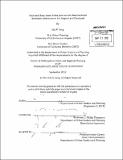Race and place : green collar jobs and the movement for economic democracy in Los Angeles and Cleveland
Author(s)
Song, Lily Kyung Bin
DownloadFull printable version (22.99Mb)
Alternative title
Green collar jobs and the movement for economic democracy in Los Angeles and Cleveland
Other Contributors
Massachusetts Institute of Technology. Dept. of Urban Studies and Planning.
Advisor
J. Phillip Thompson.
Terms of use
Metadata
Show full item recordAbstract
Faced with the problem of growing economic inequality in America and the threat posed to democracy, a number of planning scholars have put forth the idea of building progressive civil society capacity in the economic sphere to broaden stakeholder control and accountability of capitalist markets. Yet actual empirical accounts of community and civic organizations spearheading the task of framing and carrying out prescriptive economic programs, complete with alternative modes of production and exchange, have sparsely materialized. Moreover, the dominant planning perspective on the topic of building civil society to strengthen economic democracy views race as a secondary issue that may have cultural and political significance but is essentially a divisive mechanism that stymies the more important economic programs of class-based movements. In contrast, the theoretical framework underlying this study incorporates W.E.B. DuBois' notion of double consciousness along with Mikhail Bakhtin's formulations on dialogic exchange to explore how centralizing the perspectives and experiences of "racial others" might enhance critical reflection and dialogic exchange in civil society- led economic planning projects as to fortify progressive coalitions and direct their policy visions towards the deepest problems hindering democratic society. Focusing on the emerging energy efficiency sector and the green economy more generally within the context of the contemporary American city, I use two critical and emblematic cases-the Evergreen Cooperative Initiative in Cleveland and the Los Angeles Green Retrofit and Workforce Program- to build theory at the intersection of race, place, and economic democracy. Each case study is grounded in historical analysis that explores to what extent, in what ways, and how race played a role in managing the tensions and contradictions between capitalism and democracy at the local level. In turn, the case studies investigate the process by which progressive coalitions incorporated the experiences and perspectives of low-income inner city communities of color into their respective green economic and workforce development programs. At the substantive and normative level, my findings indicate that creating inclusive, transparent, but also flexible spaces for critical reflection and dialogic exchange are essential to building strong coalitions and forging policy visions that get at some of the core problems arising from privatistic urban policy and local economic development and form the stuff of economic democracy. Whether the initiation of such processes and ensuing economic projects occurs in a manner that is "top down" or "bottom up" might be less important to their transformative potential than the depth of critical analysis, reflective thinking, and mutual engagement in policy design and planning discourse. Where economic democracy is a perpetual process of becoming, it entails actors balancing the use of external resources with principles of self-determination and the achievement of project deliverables with leadership development and movement building goals. At the descriptive level, the cases demonstrate the limits of neoclassical economic theory along with its premises of rational choice theory and methodological individualism in explaining observed modes of economic action and local economic development. I incorporate insights from recent multidisciplinary studies on cooperative human behavior along with pragmatist action theory in posing an alternative analytical framework for explaining economic action.
Description
Thesis (Ph. D.)--Massachusetts Institute of Technology, Dept. of Urban Studies and Planning, 2012. Cataloged from PDF version of thesis. Includes bibliographical references (p. 253-269).
Date issued
2012Department
Massachusetts Institute of Technology. Department of Urban Studies and PlanningPublisher
Massachusetts Institute of Technology
Keywords
Urban Studies and Planning.